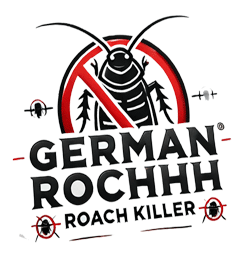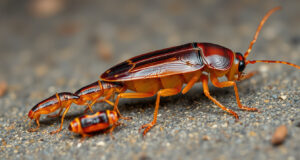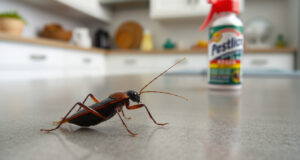German roaches live in many homes and shops. They hide near food and water. They breed fast. So, you need a good roach treatment. Quick work stops them from coming back.
In this text we set out simple ways to kill German roaches. We look at spotting them and keeping them out. You get the facts to keep your place safe and clean.
–––
Understanding the German Roach: Why Quick Work Helps
German roaches are small. They grow to about ½ inch. They show two dark lines by their heads. They live in warm, moist spots. You see them in kitchens, baths, or small gaps near food and water.
A single female can make many eggs. This means there can be many roaches very soon. They spoil food, spread germs, and may cause allergies. Fast work is needed to stop them.
–––
Top Ways for Fast German Roach Work
To beat German roaches, mix clean spaces, safe seals, and roach poisons. This mix stops them from breeding and kills roaches that already live there.
- Look and Spot
Walk through rooms where roaches hide:
• In kitchen shelves and drawers
• Behind fridges and stoves
• Near sinks and pipes
• In cracks of walls
• In dark, damp spots like baths or laundry areas
See for live roaches, shed skins, egg cases, or droppings. Seeing these helps you choose the right treatment.
- Clean Every Day
German roaches live where food and water are around. Remove marks that feed them:
• Wipe spills and crumbs each day
• Keep food in closed jars
• Empty trash bins often
• Fix leaking taps and get rid of puddles
• Remove clutter where roaches can hide
A clean room helps other work do its job.
- Place Poison That Roaches Eat
Poisons made as food work well. Roaches nibble on the bait and carry it to their home. This stops more roaches from coming.
Some good points of baits:
• They put little poison near people and pets
• They hit roaches hard
• They work for many days
Place gel baits in gaps and behind kitchen tools where roaches go.

- Stop Young Roaches from Growing
Some poisons stop young roaches from becoming adults. A mix of these and baits cuts the flow of new roaches.
- Spray or Dust for Extra Help
If there are many roaches, spray or dust may help. Use these in spots like:
• Along the sides of walls
• Behind machines
• In tiny gaps
Read all directions. Do not let poison touch your food. You can call a pro for hard jobs.
–––
Keep Roaches from Coming Back
When the roaches are gone, keep them out by:
• Keeping clean all the time
• Sealing holes near doors and pipes
• Storing food well
• Checking rooms often to see if roaches return
• Keeping kitchens and baths dry
A dry and clean spot stops roaches from coming back.
–––
When to Call a Pro
Sometimes roaches grow too many or hide deep. A pro has special tools and strong poisons to win the fight. They can:
• Check all the spots
• Make a plan just for you
• Use strong poisons
• Check again to stop the roaches
Calling one early saves time, cash, and worry. This is best for busy places like restaurants and stores.
–––
Best Ways for German Roach Work
To beat German roaches, do this:
- Check all rooms for roaches.
- Keep the place very clean.
- Use baits to kill roaches at the start.
- Add products that stop young roaches.
- Spray or dust hard areas if you need to.
- Seal any holes and keep the spot dry.
- Ask a pro if roaches win.
Mix these steps and your home or shop will be safe from German roaches.
–––
Questions about German Roach Work
Q1: How long do poisons need to work?
A1: Some baits cut roaches in a few days. Full work may take 2-4 weeks. This depends on how many roaches live there and how clean you keep the place.
Q2: Do home remedies work?
A2: Some home mixes like diatomaceous earth or oils help a bit. But they rarely kill all roaches. Mixing them with strong methods works best.
Q3: Can I use common sprays?
A3: Some sprays kill the roaches you see. They might not reach those in small gaps. Baits and targeted poisons work better. Pros may have more powerful items.
Pick the best plan for your German roaches. By knowing what to do and mixing simple steps, you can clear your space and keep it safe.
For more ideas on pest work, check the EPA’s guide on pest care at EPA Pest Management.




